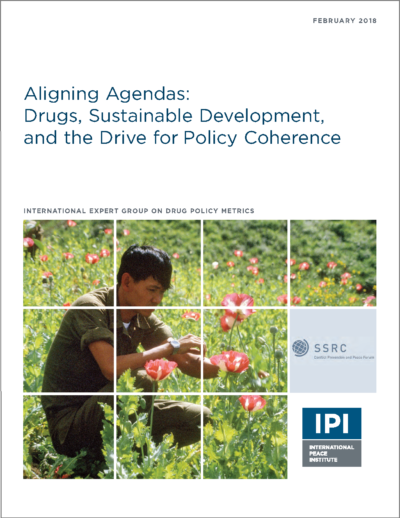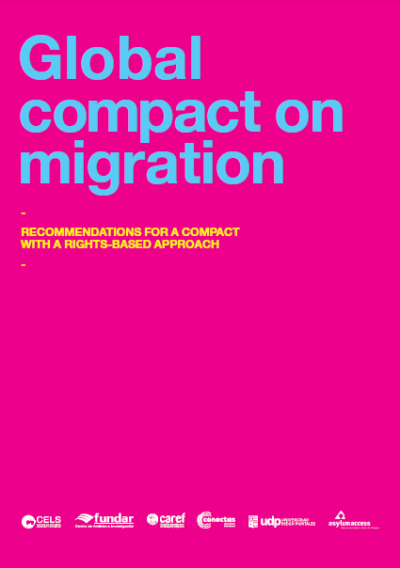Incorporating human rights perspectives into housing strategies
The UN Special Rapporteur on adequate housing presented a report on housing strategies that promote socioeconomic equality and inclusion. It mentions examples from numerous countries, including Argentina.
Social protest: Police violence against photographers and journalists
The SiPreBA media workers trade union and CELS published a report documenting cases of people injured, detained and charged with crimes while documenting protests in 2017.
Ancestral lands: the Inter-American Court will intervene for the first time in a case from Argentina
An emblematic case for guaranteeing the rights of indigenous peoples in our country has been brought before the Inter-American Court of Human Rights.
Aligning Agendas: Drugs, Sustainable Development, and the Drive for Policy Coherence
Autor/a: International Expert Group on Drug Policy Metrics
28 pgs.
ver más
Global Compact on migration: Presenting proposals centered on the rights of migrants
At the UN, States will begin negotiating the Global Compact on migration. CELS and five other organizations present concrete measures that the Compact should include to guarantee migrants’ rights.
Magdalena prison fire: Court convicts warden and official overseeing the operation
Twelve years after the fact, a criminal court convicted three officials from the Buenos Aires Penitentiary Service over the 33 deaths that occurred in a prison in the town of Magdalena.
Peru: Fujimori’s pardon violates international and inter-American standards
FIDH, CELS and Abuelas de Plaza de Mayo present an amicus curiae brief before the Inter-American Court of Human Rights, demonstrating the incompatibility of the pardon granted to former Peruvian President Alberto Fujimori with international and inter-American human rights standards.
Emergency decree against migrant persons: a selective and discriminatory policy
Today marks one year since the national government modified via emergency decree the country’s Migration Law, a product of years of collective struggle for democratic migration legislation. The result is a policy of selectivity that puts people under permanent suspicion.
Maldonado: UN Committee on Enforced Disappearances closed urgent action and requested exhaustive, impartial investigation
The UN Committee on Enforced Disappearances closed its urgent action that had requested the Argentine government to search for and find Santiago Maldonado, while reminding the state of its obligation to guarantee an exhaustive, impartial and independent investigation.
Human Rights in Argentina: Our 2017 report in broad strokes
Argentina is known globally for its hard-fought Memory, Truth and Justice process over the crimes committed during the 1976-1983 dictatorship. But numerous other human rights achievements have been enshrined in the country’s constitution, laws, regulations and jurisprudence over the years. Today, some of those are at risk.
Global compact on migration: Recommendations for a compact with a rights-based approach
Autor/a: Various
45 pgs.
ver más
One month since the repression of December 14
Seven people remain detained over incidents related to the protests of December 14 and 18, in the framework of criminal cases filed at the federal level. These prolonged detentions based on weak arguments imply very worrisome processes of criminalization. This situation also worsens the deterioration of conditions in which criminal processes unfold, hindering the right to defense.
Privacy at risk: Telegram sanctioned in Russia for protecting its users
The Russian government fined Telegram and could block use of the instant messaging app, because the company refused to grant it access to users’ communications. Members of INCLO, including CELS, seek to curb such measures.
Protest, social movements and state crackdowns
A fresh round of content published on our Right to Protest platform covers ground across the world: from Kenya, Hungary and Australia to Peru, Canada and Argentina. The threats to this fundamental right can be seen on the street, with violent repressions, and in terms of state surveillance and judicial persecution. This online project was developed by openDemocracy, CELS and INCLO, with support from the ACLU.
The right to protest is in danger
A violent and intimidating police operation. Arbitrary detentions. Federal criminal charges. Political support for police violence. No specific legal framework for regulating the intervention of federal security forces in protests. Threats by political authorities, violent actions by security forces and their judicial validation – all of these are ways of limiting the right to protest.
WTO meeting in Argentina: Rejected accreditations and deportations
The government rejected the accreditations of 65 people who planned to participate in the WTO Ministerial Conference in Buenos Aires and sent the list to immigration officials as a security “alert.” Two people on the list were ultimately deported.




